Pai Gow Tiles - Part 2 of 3 - Pai Gow Strategy
Pai Gow Tiles - Part 1 of 3 - Rules of the Game
[00:00:11] Michael Shackleford: Hi, this is Mike Shackleford, also known as the Wizard of Odds with part two of my series on Pai Gow. In this video, we will focus on the strategy which in Pai Gow is very complicated.
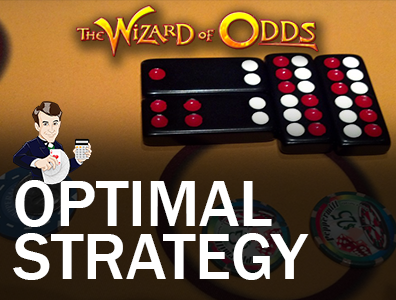
I wish I could say there's a simple strategy…
…that gets you close to the optimal strategy but there just isn't. I have three strategies on my website and various degrees of complexity that strive to get you fairly close to optimal without too much memorization involved.
Nevertheless:
Strategy in Pai Gow is just difficult, you just have to accept the challenge. Frankly, that's why I like this game because it is so challenging. It's not always playing like a robot like I do with Blackjack and the basic strategy. In this, I'm going to just try to go through some rules of thumb.
I'm not going to try to give you a specific strategy but just some general pointers. I would refer you to my website Wizard of Odds for a more complete strategy, in case I forget anything. Let's talk about the pairs first, it's always a good place to start.
Most of the time…
…if you get a two pair, it's obvious that you're going to keep that together. If you have one pair, most of the time you'll still retain it together. Sometimes the odds favor splitting it apart, if the other two tiles other than the pair make for a very low hand.
Tess, which-- according to the house way, which pairs should you never split?
Tess Dunn: fours, fives, sixes, 10s, and 11s.
[00:01:55] Michael: All right. My advice would be to never split fours, 10s or 11s. I would sometimes split fives and sixes. The math just favors that, it's very marginal, it doesn't happen very often.
The only time I would split fives:
is with the two and the 12 tile. This is what you're dealt. If you keep the pair together, you have the lowest-ranking pair there and a four-point hand there. Granted it's a high four but still four points is not very good. If you split them apart, you now have seven and seven. They are both high sevens. You'll have to take my word for it that the odds favor splitting in this situation.
Tess, have you ever seen a player split fives?
[00:02:55] Tess Dunn: I have not.
[00:02:57] Michael: I don't think I have ever actually had this hand and I've played a lot of Pai Gow. It has to be this exact situation and getting it is not very likely. My advice about splitting a pair of sixes, like this one, is only to make seven, eight or better. That's only going to happen with some combination of the two tile, the 12 tile and the 11 tile.
For example:
If these are the four tiles you have, you could play pair three but I would argue the odds favor playing like this, as an eight-seven. It's a very marginal decision if you never split sixes at all, the last unexpected value in the whole game is going to be very, very marginal.
Nevertheless
You know what a perfectionist I am, and I try to make the right play every time. It's not what the house would do. The house way was developed over hundreds of years and before the advent of computers.
Computer technology has just showed that the house way is just not always right. That's when to split sixes, splitting sevens, you would only do to make a hand of seven-seven or better. For example, if your other two tiles were two non-matching 10s.
With eights, you'd split eights to make a eight or better. If you have the nine and the 11 tile, with nine-nine. Again, it's easy, you'd split nines only to make a hand of nine-nine or better.
Tess, do you have any huge disagreements with that, Tess?
[00:04:58] Tess: No, I agree with that.
[00:04:59] Michael: Okay, that's good to know. We didn't talk about when to split the teen pair and the day pair. You would only split these to make six-eight or better. For example, if you were dealt the teen pair and you had these two, you could play this as a high pair and a zero if you wanted to.
I would argue your value is much better of by splitting them apart and playing it eight-six. What's the house's strategy on that, Tess?
[00:05:43] Tess: We also play six-eight or better.
[00:05:46] Michael: Okay. It doesn't matter whether it's the teen or day, only split them to form six-eight or better. I think there's only one pair left to talk about, the highest pair, the Gee Joon pair.
You will almost never split this apart and it's heartbreaking to do it because you know it can't be beat. Nevertheless, if the other two tiles are both sixes, a six and a five or a six and a four, then the odds favor splitting them apart.
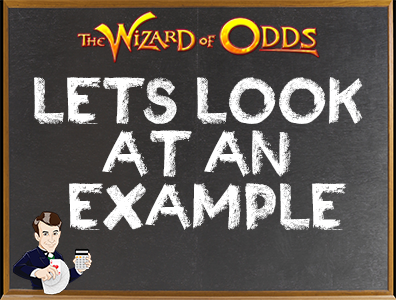
Let's look at an example:
If this is what you were dealt, you could play the high pair here but here you've only got zero, that's almost a guarantee push. If you split them apart, you've got nine points here and seven points here. seven-nine is a strong hand, it's stronger than average.
The odds would definitely favor splitting the Gee Joon in that situation. Again, if the other two tiles are six and six, six and five, or six and four. Tess, what's the house's strategy on splitting Gee Joon?
[00:06:59] Tess: four-six, five-six, six-six, it's the same.
[00:07:02] Michael: Okay, we're in a 100% agreement there.
[00:07:04] Tess: We are.
[00:07:06] Michael: If you can't remember all this, don't worry about it. With any hand you can always ask the dealer, "What is the house way? Or what would you do?"
The house way for the splitting pairs is very close to the optimal strategy for splitting pairs. I wouldn't hesitate to take the dealer's advice when it comes to the pairs. Any questions on splitting pairs, Heather?
[00:07:37] Heather Ferris: Do you split the pairs that don't match to the same as you do the other pairs?
[00:07:41] Michael: Yes. For example, with the rule with splitting eights, it's to make eight-eight, or better or with the nine and 11. It doesn't make any difference whether it's the low eight pair or the high eight pair.
[00:07:52] Heather: Okay, awesome. You've explained everything, great. Thank you.
[00:07:56] Michael: You're welcome. Next let's talk about the strategy when you can make a Wong, a Gong, or a high nine. I don't think I've defined the high nine yet. A high nine is any nine point hand that is composed of one of these two highest-ranking tiles, and a seven. That would be a high nine or this would be a high nine, or you could switch them around.
Again, you're looking for…
…those nine point totals but with a high-ranking tile as a kicker. As a good rule of thumb, if you can't make a pair, then check your hand for the possibility of a Wong, Gong or a high nine. That's easy to do, just look for these two tiles.
As a good rule of thumb
And there are exceptions for the advanced strategies. If you can only make a high nine, Gong or Wong one way, then make it whatever the other hand is. However, sometimes you'll have both of these tiles and let's say that you have the-- No, that's a bad example. Let's say you can make a Wong, a high nine, and let's just say the other tile is this 11.
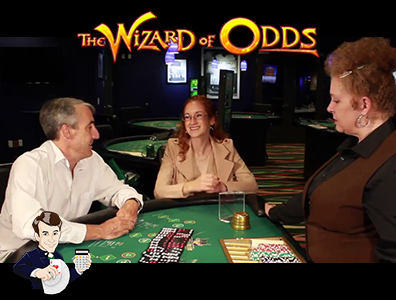
Here:
You can make a Wong or a high nine. Which should you do? Sometimes it's obvious, and this rule carries the Pai Gow to every situation in Pai Gow. If there's one way to play the tiles, that is superior to all other ways in both the high and the low, then that is exactly what you should do. That's the case here. With any four tiles there are three possible ways you can play it.
In this case, we could play Wong, eight, we could play high nine, zero or we could play three-six. Playing this Wong eight is superior to everything else in both the high and the low, therefore it's obvious.
This rule will carry you through a lot of hands, probably about 40%, it comes up a lot, these obvious situations. Same as in Pai Gow Poker, a lot of hands are obvious but some of them you have to choose whether to play conservatively or by balancing or have one high and one level.
Let's say…
…that instead of this 11, let's say that we had a five, here we could play a Wong two or we could play nine-four. How would the House do that one, Tess?
[00:11:15] Tess: We would play the four and the nine.
[00:11:18] Michael: That's not what I would do. Like I said before, I don't always agree with the House way. One rule I have is that if you can play a Wong and the other hand is two or less then that's how you should play it.
My thinking is that if you play this as a nine-four, I don't like fours in the low, I like to get my low at least up to five. If I can't get this at least to a five, I'm going to say, "To heck with the low, I'm going to make my high as best as possible," and play it that way.
It's a marginal situation. Most of the time when you're put into a situation where you can play high nine, Gong and Wong, two or more different ways, most of the time you should balance the hands. Namely, playing the high nine first, if you can, then the Wong, and then the Gong, but this is just an exception to that rule.
While we're on the topic of the high nines, Gongs, and Wongs, another situation that you see a lot is something like this. We have a high nine two different ways. We can play it like that or we can combine the seven with the two tile. In this situation, the odds favor making that nine as high as you can, and the reason is this game sees a lot of nines in the high hand.
If you get to nine points in the high hand you really want to kick up that kicker as high as you possibly can. Therefore, this is how I would recommend playing a high nine if you have both the teen and the day tile.
Your thoughts, Tess?
[00:13:17] Tess: I agree with that.
[00:13:18] Michael: Again, the main rule of thumb is that high nine beats a Gong or should be played before a Gong, and a Gong should be played before Wong, except if in doing so, the low hand is less than a four or a five, then I would sacrifice the low and make the high hand as high as possible. Again, the strategies all are explained much better on my website in writing, do you have anything to add to that, Tess?
[00:14:13] Tess: No, that's quite a lot, yes.
[00:14:14] Michael: I know it's a lot to digest, any questions, Heather?
[00:14:18] Heather: I'll let you know if I can't digest any of it.
[laughter]
[00:14:21] Michael: Next, we will talk about how to play the many situations where you don't have a pair, and you don't have a high nine, Gong or Wong. Much of the time you're not going to be able to make a pair of Wong, Gong or high nine.

In that case:
My basic strategy is I try to get the low hand to at least a five. If I can, then I balance the hands meaning that I try to maximize the low hand. If I can't get that low hand to at least a five, then I'm going to sacrifice the low hand, and make my high hand as good as possible. Except if I can't get my high hand to at least a seven, then I'm going to think this hand is just so awful that I'm going back to balancing it.
This is similar to the House way except, the House only needs to get to what's called a high three or better to be satisfied in balancing.
I'm a little more aggressive, I try to get it to the five and you might ask, "What is a high three?" A high three is, it's this one that is the critical one, right?
[00:15:49] Tess: Correct.
[00:15:50] Michael: This and a seven, the House is going to try to get to this in order to balance, and they call it up a high three.
[00:16:04] Tess: Also a Chong three.
[00:16:06] Michael: Yes, just remember this tile is the one that you need to get to three points and at least this tile for the high. I know that went by fast but I think it would help if we just played some random hands to show you some examples.
Shall we do that, Heather?
[00:16:24] Heather: Yes, definitely.
[00:16:30] Michael: Tess has mixed up the tiles. So, Heather, place a bet and as I explained in part one, we're playing this on a felt for a different table because we didn't have a Pai Gow layout available, but there's just one bet to make, so we'll just put it there.
The dealer shakes the dice to determine where the first set of tiles is delivered to. Once the dealer-- Let's just try to face up all of you and see this actually at the table. I'll go over my hand first, this is going to fall under that-- I could play-- if I played it like this it would be five and three.
My three is not making it all the way up to the five point, I am going to try to make the high hand as high as possible, which I already am.
Like I said
I try to get to a seven which I do. I am going to play this seven-three. How would you play this one, Tess? I would imagine you would play four-six?
[00:17:49] Tess: Four and a six.
[00:17:50] Michael: This is just some place where I differ with the House way and when you're actually at the table, once you're done, just put both hands in two separate piles like that.
Okay, Heather, let's see what you have, oh my goodness. This is the situation we were just talking about where you can play both a nine or a Gong.
[00:18:12] Heather: Did I do it right?
[00:18:14] Michael: Let's see.
[00:18:15] Heather: Was I listening?
[00:18:15] Michael: Let's see, this way here you have it as a nine-five. Yes, I agree with that. Do you, Tess?
[00:18:28] Tess: I agree with that, that's super five-
[laughter]
[00:18:32] Tess: -we call that one. All right, six and nine.
[00:18:39] Michael: Let's go over slowly for the camera, how you adjudicate this. You can see that you both have nines in the high, which like I said before, happens a lot. It goes to the high tile to break that tie.
Heather wins in the high, in the low Heather has five but you have six. Tess, you win the low, it goes one and one, so it's a push-
[00:19:09] Tess: We push.
[00:19:10] Michael: -and I lost.
[00:19:17] Tess: Yes.
[00:19:17] Michael: Shall we try a third hand, Heather?
[00:19:22] Heather: Yes, let's give it a shot.
[00:19:23] Michael: Okay, place your bet. I recommend $25 for a reason I'll explain later.
[00:19:26] Heather: You're going with the position of the dice, whatever the number the dice is is what position you start at?
[00:19:37] Tess: Yes, correct.
[00:19:38] Heather: Okay.
[00:19:38] Michael: Once she's done, you can check your tiles and let's just flip them over for the audience. The way I like to do it is to put the tiles in order from highest to lowest and then usually I see what it looks like if I match the highest and lowest.
Here I have seven-six
I already know that I like that. Like I said before, I try to get the low to at least a five which I did here. This feels right to me. six-seven. Heather, let's see what you have. This is obvious, you should play that a Wong nine.
[00:20:36] Heather: Which is those, okay.
[00:20:38] Michael: Yes.
[00:20:39] Heather: Basically the only one I didn't pick was the one I should have.
[laughter]
[00:20:44] Michael: Remember, these are special. Always check for these and you try to combine them with a seven, eight or nine. Remember, these are semi-wild. They can be worth three or six. In this situation, we are keeping it just as a three, six plus three is nine. The dealer has nine-zero, so you win.
[00:21:13] Heather: Oh, yay.
[00:21:17] Michael: I pushed because the dealer beat my hand. This gives me an opportunity to talk about the commission.
You may remember…
…before that I said the commission is 5%. 5% of $25 is $1.25. The casinos, either because they're nice, they round it down to a dollar, or maybe the reason is they just don't want any quarters on the table and it would look cheap to make you pay two dollars, rounding it up. $25 is a nice amount to bet at this table because it cuts down the commission, actually, to 4%.
Let's try another hand and this time let's watch the procedure of--
[00:22:04] Tess: The shuffle?
[00:22:05] Michael: Yes, the shuffle.
[00:22:14] Heather: You're watching the tiles, right?
[00:22:16] Tess: Yes, I am.
[00:22:25] Heather: Now, they were watching the tiles before they started watching the cards, right? When we watch the cards on the table we're actually mimicking a Pai Gow tile.
[00:22:32] Tess: Yes, they are.
[00:22:34] Heather: Awesome.
[00:22:35] Michael: Yes. A lot of gambling stems from Pai Gow.
[00:22:47] Heather: Why did you push that up?
[00:22:49] Tess: That's to indicate for surveillance and for the floor supervisors that that's the first hand going out.
[00:22:56] Heather: Is it called anything else?
[00:22:58] Tess: House way.
[00:22:59] Heather: Head of the dragon?
[00:23:00] Tess: Head of the dragon, yes.
[00:23:14] Michael: The dealer's done so we can check our tiles. Again, I like to put them in order and then see what it looks like comparing the highest with the lowest. That results in three, this results in five.
I really don't like playing it three-five. Like I said before, I try to get the low up to a five if I can. I couldn't, so now I'm going to see what it looks like playing the high as high as possible, which is this way, meaning seven-one. This is how I would play it. You would play it this way too, because playing the high three--
[00:24:00] Tess: The House would play three and five on that one.
[00:24:03] Michael: Yes. Again, a disagreement with me with the House, but I'm sure it's fairly close.
[00:24:18] Tess: [unintelligible 00:24:18] Gong.
[00:20:40] Michael: That's going to be hard to beat. Dealing would be both ways, Heather. The dealer had a strong hand. Heather, before we play our next hand, let me talk about the importance of banking. As I mentioned in part one, in the event that the high tile does not break a tie, then whoever is banking wins that face-off.
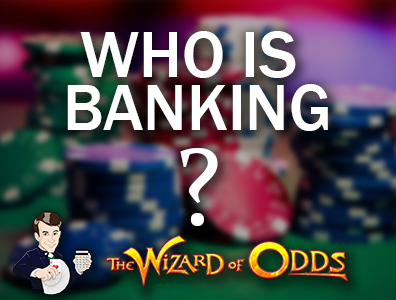
Who is banking, you might ask?
Well, the turn to bank rotates around the table. Some places it zigzags but most places it rotates.
Most players decline the option to bank, but when I play, especially if I'm playing by myself, I invoke my right to bank every single time assuming that it's not going to cause any ill-will with the other players, which I'll talk more about later.
When you're playing head-to-head with the dealer you can bank every other hand. Banking is valuable. It cuts the House advantage significantly by an amount that I will explain a little bit later.
Let's go on to the next hand please, Tess.
[00:25:46] Tess: Would you like to bank?
[00:25:47] Michael: Yes, please.
[00:25:49] Tess: All right, Mike. There you go.
[00:25:52] Michael: I forgot to bring a proper banking chip, so we're using the lens cap from my camera.
[00:25:57] Tess: Would you like to cut the tiles, Mike?
[00:26:01] Michael: This is something we're going to talk about in part three. The miscellaneous topics about Pai Gow, but there's various ways you can-- what's called Cut the Deck or Cut the Tiles. I don't even know what this is called but that's what I do and the dealers know what I mean.
[00:26:19] Tess: It's called Jung Quat. It means take the heart.
[00:26:22] Michael: Okay. I did not know that. Notice how Tess let me shake the dice. If you're banking you get to do that but only shake them. Do not lift up the lid as I did the first time I ever banked.
One of my other pet peeves in Pai Gow is when players, and 100% of the time it's an Asian player, they just really slam that cup on the table. I don't know why they have to do that. A nice, gentle shake is my style.
[00:26:58] Tess: That will do 18.
[00:27:03] Michael: We forgot to make our bets, Heather.
[00:27:04] Tess: No, because you're banking. You don't have to.
[00:27:07] Michael: You're right. That brings up yet another topic. How much am I betting when I'm banking? If you're playing just against the dealer, the dealer will bet against you, whenever you bet her against her the last time.
Now
In this situation there's another player at the table, Heather. I am going to be banking-- both of you are going to be playing against me, much like the previous hand both of us played against Tess.
If it's not a rule, it's common courtesy, that the banker should wait for the other players to act. Normally, I would be a gentleman and not look at their tiles but since this is a demonstration I'm going to see what you have.
Nice hand, Heather. Definitely keep that pair together, because the alternative is not very good. I also have a pair. Like I said before, the rule for splitting two sevens is to make seven-seven or better which I can't do.
If I split these, I would just have three-one, so I'm going to keep my mixed seven pair together and I have only one in the low. A likely push against Tess, and now Tess will look at hers.
[00:28:49] Tess: Four and six. Mike has one in a pair so we push. Mike goes against Heather. Heather has four in a bigger pair so Mike pays Heather $25.
[00:29:04] Michael: Right. It's proper etiquette to give the money to the dealer and then the dealer gives it to the winning player, and then the player would pay the commission to the dealer, not the banking player.
[00:29:18] Tess: Correct.
[00:29:22] Heather: You say it's good to bank because it's an advantage for the player, but you said there were some times where it's not good to do it. What were you talking about?
Could you tell me a little more about what you were saying?
[00:29:36] Michael: This is a very delicate subject. Let me repeat that, if you're playing head-to-head with the dealer, always accept your turn to bank. It gets more sensitive when there's other players at the table.
I hope I won't offend anyone in saying that Asian players can be very superstitious. If the game has been going well and you join the table, and start asking to bank, they're not going to like it. I can 99% guarantee you, they're not going to like it.
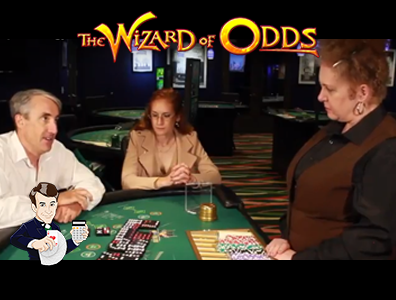
They're going to say:
"Things were going just fine with the dealer banking, don't mess up a good thing." Total superstition but that's the conventional thinking. If I am joining a table and other players are already there, I'm going to feel like the newcomer and I'm going to defer to the table if they mind me banking.
When it comes my turn, I am going to ask the other players, "Do you mind if I bank?" And sometimes they will be polite about it, like they probably don't want you to but they don't want to be rude and say no.
Here is where you really have to feel the tone of their voice, how they say no, gestures, things like that, feel them out. I don't make any claims to having an advantage in Pai Gow. When I play, I'm playing for fun.
I don't want to cause any ill-will at the table. That's just me. Some people will fight for an advantage every place they can get.
If the other players don't want me to bank I'm not going to, that's just how I am. However, if I was at the table first and other players join in, I'm still going to ask but if I feel like it's a borderline situation, I'll be a little bit more aggressive about the banking because I feel that I was here first. There's just this attitude in all table games.
For example, if you're smoking: I think that if you join a table where there's already people smoking, you have no right to complain about it but if a nonsmoker starts a table by himself and a smoker joins in, I am going to do the big old fan, believe me. [laughs] That's my feeling about it.
Any questions?
[00:32:15] Heather: I really want to see you do the fan one day, I want to go there and I want to see you do that.
[00:32:19] Michael: I promise you, I will do that for you.
[00:32:21] Heather: Fantastic.
[00:32:23] Michael: Tess, deal us another hand, please. By the way, Tess is dealing because it's her turn. Because I did it last time and it rotates this way. Remember, this is going to be worth three or six points.
The way I'm going to play this, remember, I try to get my low to at least a five. If I play it like this, I can play five-six, so my low is good enough. That is my decision. Heather, you could either play this as Wong-one or nine-three.
[00:33:18] Heather: What do you suggest?
[00:33:19] Michael: I like Wong-one. I believe I said that if you can play a Wong and the low is a zero, one or two, that's what you should do. What's your opinion, Tess?
[00:33:33] Tess: Also, the one-Wong. The three is not big enough for us to play the nine, we go one-Wong.
[00:33:39] Michael: The House also follows the high-three rule in that situation.
[00:33:42] Tess: Correct.
[00:33:43] Michael: We agree there.
[00:33:44] Tess: All right. Two and three.
[00:33:50] Michael: Nice for us.
[00:33:54] Tess: One-Wong, you play Wong.
[00:33:56] Heather: [laughs]
[00:33:59] Michael: I like that.
[00:34:00] Heather: That's awesome.
[00:34:07] Michael: In all seriousness, though, you did play it right and as I always say, it doesn't matter whether you win or lose. It's whether or not you made the right bet, and in this case, the odds favor in doing what you did.
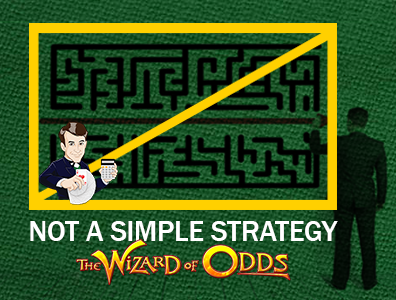
[00:34:23] Heather: After all of this, after everything we've done, what's the House advantage on this? Where were the numbers on this?
[00:34:30] Michael: Good question. What is the bottom line to this whole complicated game? And it all depends on how strong your strategy is, and whether you're banking or not banking.
Now, on my website I have what's called J.B. Simple Strategy. Guy named with initials J.B. He used to work for me and helped me with a lot of Pai Gow analysis and he created-- I asked him to make a fairly simple strategy and of course he made it more complicated than what I wanted but nevertheless he created a pretty simple one and most elements of it I stated here already.
That said, playing the J.B. Simple Strategy when you are not banking, when the dealer's banking or another player, you're going against the 1.9% House advantage. When you are banking, you enjoy very low House advantage of just 0.1%. If you are playing face up with a dealer and banking every other hand, the average House advantage is right at 1% which compared to other casino games is quite good.
It's not the best but it's nice and low. Another great thing about Pai Gow is it's a slow game. If you're looking for a slow game that does not have a lot of volatility, I think you just can't beat Pai Gow. I think it's fun, it's challenging. For me, it's everything a casino game should be.
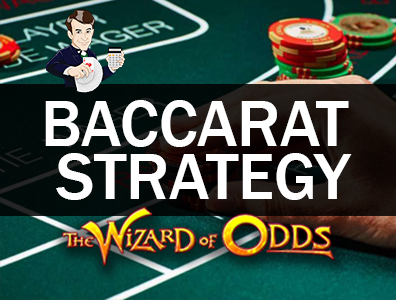
[00:36:06] Heather: If you have the house [unintelligible 00:36:08] on this game and you compare the house [unintelligible 00:36:10] for this game to, say, blackjack and Baccarat, which one has the better one because aren't they all around 1% or is Baccarat a little bit less than 1%?
[00:36:17] Michael: Blackjack depends upon the rules of the game but as long as the blackjack pays three to two, and never play if it doesn't, then the house advantage is going to be less. It's going to be anywhere from about 0.8% to 0.2%, depending upon all the other rules.
Baccarat, the House advantage is higher, it's 1.6% on the banker bet and 1.23% on the player bet. It's better than Baccarat but not as good as blackjack. Perhaps it's also better if you stick to the all the best bets, namely just line bets and taking full odds.
You might ask, "What if I don't memorize your J.B. Simple Strategy? What if I just play the same way the dealer does known as the House way?" There the House advantage is higher, the J.B.
Simple Strategy is simpler than the House way and it cuts down the house advantage by 0.48% or almost a half percent and in the casino every hundredth of a percentage point matters, that's a lot. Serious students of the game, I highly recommend you check the resources on my website.
There's very few people on this planet that get close to optimal strategy or even within 99.9%. I do not consider myself one of them but I know people who are, they just seem to know every single hand and the house advantage there is 0.27% lower than with J.B. Simple Strategy, 0.27%. There you have it, in terms of the odds it's one of the better games to play.
Do you have anything to add to that, Tess?
[00:38:29] Tess: Come out and play it.
[00:38:31] Michael: Yes. Would you agree it's a pretty slow game, like what's the average number of hands per hour?
[00:38:36] Tess: I wouldn't even know, it's very slow.
[00:38:39] Michael: It's probably at most--
[00:38:42] Heather: 60, or might be 30.
[00:38:44] Michael: I think it's like 30 to 40 depending upon the number of other players. If you're looking for a good challenge, I think Pai Gow will give that to you. I would say that concludes this part two on the strategy for Pai Gow.
I know we didn't cover all of it. Thanks to Heather for being my student and the videographer. Tess for being the dealer. Thank you to Galaxy Gaming for letting me use their studio.
In part three, we're going to talk about some of the more miscellaneous points to Pai Gow. That won't necessarily improve your game, but just some things you may be wondering about it, especially the players that already know how to play.




